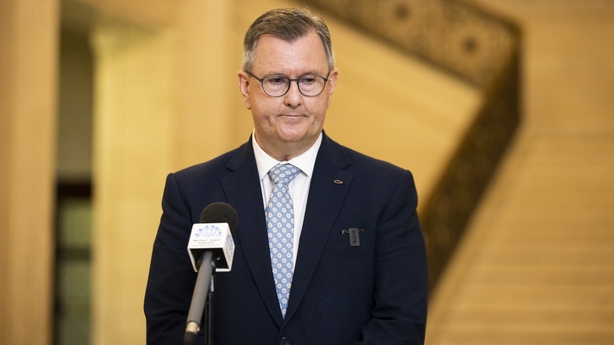The DUP has refused to support the nomination of a speaker at a recall of the Stormont assembly meaning legislation to introduce opt out organ donation cannot be implemented.
Sinn Féin had secured the recall to debate and pass Dáithí's Law, in honour of six-year-old west Belfast boy Dáithí Mac Gabhann, who is awaiting a heart trasnsplant and is present at today’s recall.
The law would mean every adult in Northern Ireland would be considered to be potential organ donors after their death unless they specifically state otherwise.
The DUP have boycotted power-sharing for over a year and vow to continue until its concerns about the Northern Ireland Protocol are resolved.
We need your consent to load this rte-player contentWe use rte-player to manage extra content that can set cookies on your device and collect data about your activity. Please review their details and accept them to load the content.Manage Preferences
Dáithí and his parents Máirtín and Seph arrived at Stormont this morning, where they were greeted by Sinn Féin deputy leader Michelle O'Neill.
The DUP had already made it clear it would block the nomination of a Speaker and has accused Sinn Féin of blackmail and "stunt politics".

At the outset of proceedings in the Assembly, UUP leader Doug Beattie proposed his party colleague Mike Nesbitt for speaker, while SDLP MLA Colin McGrath proposed his fellow party member Patsy McGlone.
Opening the subsequent debate, Ms O'Neill said the recalled sitting was not about party politics.
"Today is about those of us here who are legislators fulfilling our duty and delivering through on the Organ and Tissue Donation Act 2022 - Daithi's Law," she said.
"Over 130 people are currently waiting for an organ, 90% of people in the north support organ donation, and every party in this chamber supports this law.
"So Mr Acting Speaker (Alan Chambers), there is little else to be said. The power is in the gift of each party and every single MLA to save lives by legislating in this place here today.
"Put simply, not to do so is a dereliction of duty, and it's really disheartening for all those families involved.
"There is an onus on all of us here today to work together and most importantly to give hope to all those families who need us to get this done."

DUP MLA and former first minister Paul Givan said Daithi's family had fought their campaign for change to organ donation laws with "great dignity".
He said the power-sharing impasse was "regrettable" as he restated the DUP's reasoning for blocking the institutions while the Northern Ireland Protocol remains in place.
Mr Givan criticised Northern Secretary Chris Heaton-Harris's handling of the issue and accused him of delivering different messages in private to the parties from his public statements.
"The Secretary of State is not handling this issue in a way which should be befitting of the office he holds and I appeal to him to work in a manner in which is much more constructive and apolitical than the approach that he has taken to date," he said.
"The government have legislated on other issues - same-sex marriage, abortion, the Irish language, and they were able to do that on issues which were much more controversial than an issue like this, which we are all united upon, which all of the parties in this Chamber have collectively called upon the Secretary of State to pass at Westminster given that, in the absence of an Assembly and the Executive, it remains the sovereign parliament to do so.
"So, I appeal to the Secretary of State - he can do this, he should do this and our MPs at Westminster will be seeking to bring this forward so that we can give effect to what this Assembly passed in support of the organ and tissue Bill."
What is the NI Protocol?
The protocol is part of the Withdrawal Agreement - the international treaty under which the UK left the EU.
It was a compromise to prevent a hard border with checks on goods crossing from Northern Ireland into the Republic of Ireland and the EU's Single Market.
Under the deal, Northern Ireland left the EU along with the rest of the UK.
But the British government accepted that it would stay aligned with the EU’s Single Market rules for goods.
That allowed the checks to be done at Northern Ireland’s ports instead of along the 300-mile land border. It has been dubbed 'The Border in the Irish Sea'.
The EU’s rules on customs and regulation of agri-food products also continue to apply to goods arriving in NI.
Take care of 'tone, language and behaviour'
In a letter to all of Stormont's MLAs ahead of the meeting, the current Speaker Alex Maskey urged them to take care with their language and tone during the debate because of the sensitivities involved.
He said the party whips had agreed that the debate "should be mindful that many people watching the sitting have a personal connection to the sensitive issues at stake".
He added: "I would ask all Members to take care that their tone, language and behaviour do justice to the serious issues involved."
Mr Maskey also pointed out that the new law could not be implemented today even if a new Speaker was appointed and the parties were in agreement.
But he said the appointment of a new Speaker and deputies would allow the Assembly to move on to deal with other business "and schedule any further sitting as soon as is desired".
Additional reporting PA and Áine Ní Ghallchóir







